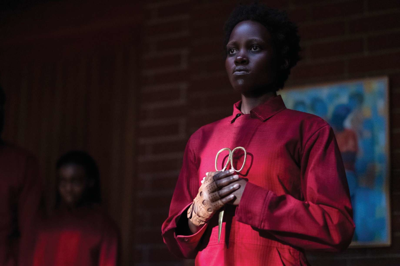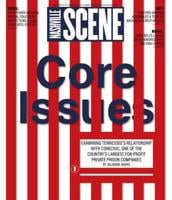
With his directorial debut Get Out and now with his sophomore effort Us, Jordan Peele is proving himself to be a savvy chronicler of turmoil in the American soul. But if Get Out gained its power by the way it so brazenly transformed the metaphors of plunder and erasure into literal acts, Us goes in a somewhat opposite direction, taking a simple horror movie set-up and letting it gather an elusive, growing sense of thematic force. If Get Out was a dagger, Us is a storm cloud.
The new picture is also, in some ways, more assured than Get Out in the way it delivers traditional but effective genre pleasures. It follows a middle-class family of four as they journey to their summer home. The mother, Adelaide Wilson (Lupita Nyong’o), is wary of this place because of an incident from her childhood when she accidentally strolled into a beachside funhouse called Merlin’s Forest and ran into her doppelgänger — a story she’s never told her family, choosing simply to say that she’s weirded out by the public beach nearby. Good-natured dad Gabe Wilson (Winston Duke) thinks nothing of mom’s anxieties, while the kids, teenage daughter Zora (Shahadi Wright Joseph) and mask-wearing oddball Jason (Evan Alex), seem to have their own concerns. But soon enough, a family that looks exactly like the Wilsons arrives outside their summer home, dressed in red, silently glowering with menace, and ready to do harm.
To say much more here would undermine some of Peele’s well-timed twists and revelations. But know that he weaves images of Adelaide’s traumatic experience as a child with the immediate suspense of his present-day scenario, and in so doing always hints that there’s a lot more to this tale than a mere home-invasion thriller. Even as Us works as a horror flick — and it works quite well as such — you can’t shake the gnawing sense that it’s building to something even more horrific than its surreal premise.
Key to this endeavor is Nyong’o’s phenomenal performance: Not only does she expertly portray Adelaide as the mother goes from haunted worry-wart to enraged mama bear — she also has to lend depth and pathos to Red, Adelaide’s double, who speaks in a determined but imperious croak. (She’s the only one of the invaders who can speak at all.) Peele also enhances the notion that there’s more here than meets the eye by dropping little references that don’t necessarily signify anything in the story itself — a Biblical reference here, a Black Flag T-shirt there — but heighten our unease, our sense that there’s another world beneath the film’s surface.
Some may find Us a bit of a letdown after Get Out’s caustic and beautifully specific portrait of race relations, but the new picture certainly speaks to other disturbing social realities. In its depiction of ordinary people tormented by more violent, impulsive versions of themselves — stripped of social niceties and hell-bent on destruction and conquest — the movie conjures a deeply fractured world, one that shuttles off its less savory sides to dark, forgotten corners, out of sight and out of mind. In some senses, this is the familiar “return of the repressed” idea that American horror loves so much. But Peele’s elegant command of cinematic grammar, and the surprisingly melancholy mood he captures in the film’s more reflective passages, provokes a deeper response than just good-natured shrieks of shallow fear.
Look at Us, and then look at us. This is a movie about divided selves, in a divided nation.





